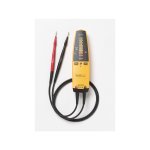As a retired electrician we call them tic tracers. If you have one be sure you check it at known live source.
Yes, that's the most important thing to do. First check it on a "turned on" outlet on the pedestal, and it should beep and/or light. Then check your RV for a hot-skin voltage. The fear is that the batteries or electronics could die and the tester wouldn't beep on a real hot skin.
BTW: That's also why I don't recommend the "always on" versions of these testers. There's too much chance that the batteries will be dead and it won't indicate a positive hot skin. I like the ones with an actual "ON" button and some sort of indicator light which show's that the unit is operating. Even then you still want to test it first on a powered outlet.
As far as using a voltmeter for this test, that's the gold standard if you're an electrician or electrical engineer (I'm both). However, it has to be used exactly right and you must punch a sharp meter probe through the paint or rust to get a connection, and you need to drive a ground rod (or a least a screwdriver) in the ground for a proper test.
Now please realize that I've developed a true hot-skin demonstration which allows me to bias the chassis and skin of an RV with any voltage I want. And I'm convinced that a Fluke VoltAlert or Klein NCVT-1 is the simplest and safest way for any consumer to find an RV hot-skin condition. I've personally done this test hundreds of times on actual hot-skin RVs, and I've never had a false positive or negative. The only time there was a misreading was from an RV parked directly under high-voltage power lines. And there was actually an induced voltage on the skin of the RV from the power lines overhead even though the RV wasn't plugged into shore power. I don't consider that a false positive since the RV actually had an elevated skin voltage.
Please let me know if you have any questions about how this all works since I've discussed this at length with engineers from the major meter manufacturers.

